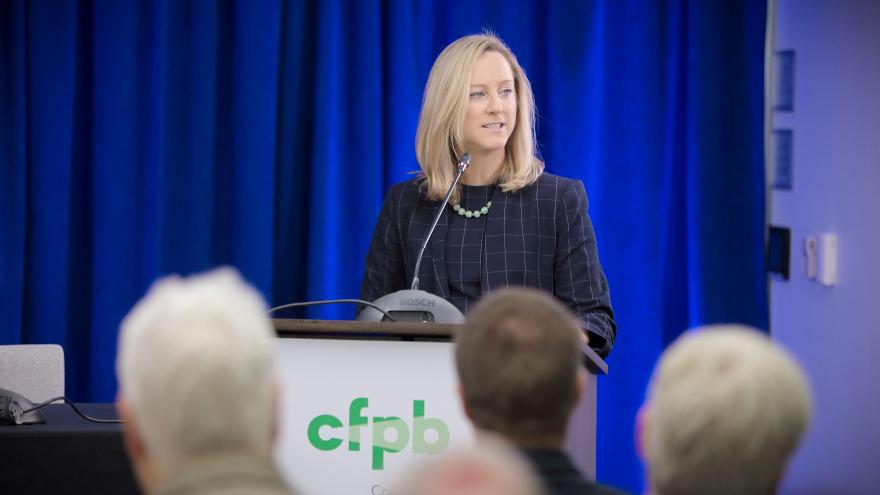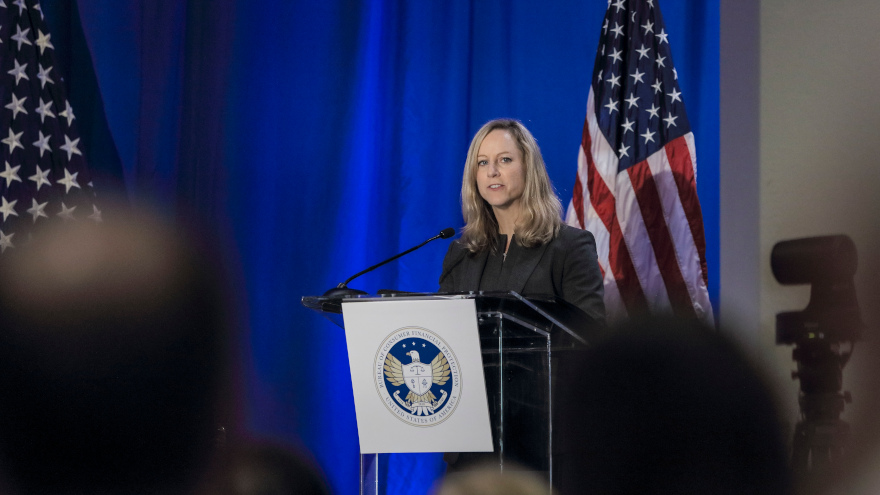More reaction rolled in stemming from Monday’s Supreme Court decision involving the Consumer Financial Protection Bureau.
While some legal experts are pondering long-term ramifications of the decision, nearly half of the attorneys general in the U.S. celebrated because the Supreme Court also agreed with the argument made in a multistate amicus brief connected to how these states could oversee auto-finance companies and other providers of financial services.
Led by New York attorney general Letitia James and joined by a coalition of 23 other attorneys general, they said they fought to ensure that the states can continue to benefit from “powerful tools” granted to both the CFPB and the states under Title X of the Dodd-Frank Act to safeguard against fraud and abusive consumer practices.
To recap, the Supreme Court ruled via a 5-4 decision in Seila Law LLC versus CFPB, determining the bureau’s leadership structure was unconstitutional and changed its single director from a position that could only be fired for cause to a what some officials are calling a “political position” removable at the will of the president.
In 2017, the coalition recapped that the CFPB commenced an investigation into the California law firm Seila Law for its debt-relief practices. Seila Law sought to block the investigation entirely, arguing that the CFPB is unconstitutionally structured because the agency’s director may only be terminated by the president “for inefficiency, neglect of duty, or malfeasance in office.”
According to Seila Law, this for-cause removal provision impinges on the executive power and violates the U.S. Constitution’s separation of powers clause. The U.S. District Court for the Central District of California and U.S. Court of Appeals for the Ninth Circuit both rejected Seila Law’s arguments and upheld the constitutionality of the CFPB.
While the Supreme Court on Monday reversed those decisions, holding that the Dodd-Frank Act’s for-cause removal provision is unconstitutional, the coaltion pointed out the Supreme Court further held that the CFPB’s creation and the powers it has to protect consumers are severable from that provision — the position that the amicus brief led by James had advocated.
While the CFPB director can now be removed at the will of the president, James called on the current CFPB director to work to protect consumers and ensure the financial protection of the American people, instead of focusing on protecting financial institutions.
“Following the Great Recession, the Dodd-Frank Act created the CFPB and granted vigorous enforcement powers to the states to ensure that consumers could never again be egregiously defrauded, deceived, or misled by private companies, and with today’s Supreme Court decision, that important work can continue,” James said in a news release. “Although we disagree with the Supreme Court’s ruling about the director’s independence, a separate ruling the court issued protects years of financial and consumer protections that have saved Americans hundreds of millions of dollars and remedied countless abusive and fraudulent practices.
“The CFPB can continue to be an independent enforcer of consumer protection and states can continue to pursue remedies under federal law to root out fraud and abusive consumer practices in the market. It’s time, however, that the current CFPB director actually focus on the financial well-being of the American people, instead of leaving them to fend for themselves,” James went on to say.
The other attorneys general involved in this coalition included:
—California
—Colorado
—Connecticut
—Delaware
—Hawaii
—Illinois
—Maine
—Maryland
—Massachusetts
—Michigan
—Minnesota
—Nevada
—New Jersey
—New Mexico
—North Carolina
—Oregon
—Pennsylvania
—Rhode Island
—Vermont
—Virginia
—Washington
—Washington, D.C.
—West Virginia
—Wisconsin
Legal scholars chime in, too
David Driesen, a professor at the College of Law at Syracuse University, worries about how much more power the president now in connection with the CFPB.
“The Supreme Court today created a Presidential constitutional right to fire government officials for political reasons. President Trump’s abuse of firing authority and the history of the world show that such unchecked power threatens the rule of law and the survival of democracy,” Driesen said in a statement sent to SubPrime Auto Finance News.
New Civil Liberties Alliance (NCLA) elaborated about that point even further. The NCLA said it’s a nonpartisan, nonprofit civil rights group founded by legal scholar Philip Hamburger to protect constitutional freedoms from violations. NCLA said its public-interest litigation and other pro bono advocacy strive to tame the unlawful power of state and federal agencies and to foster a new civil liberties movement that will help restore Americans’ fundamental rights.
“The unelected and unaccountable CFPB director has been described as the ‘second most powerful person in Washington, D.C.,’ a situation created when Congress decided to insulate this particular agency head from any oversight by our elected officials. Fortunately, the Supreme Court understood that this structure violates the very foundation of our republic, ruling that it is the president who is the head of the executive branch, and all executive branch officials are answerable to him. Today’s ruling is a win for Constitutional order.” NCLA senior litigation counsel Harriet Hageman said in another statement to SubPrime Auto Finance News.
Michael DeGrandis, another NCLA senior litigation counsel, added, “Because the court mistakenly left the rest of the statute intact, it has created an entirely new problem that may be even more constitutionally pernicious than the first. The president now has total control over an agency with a direct pipeline to Federal Reserve funds, without any appropriations control from Congress. This unconstitutional setup should be struck down at the court’s first opportunity.”
Many automotive lenders face challenges today associated with maintaining compliance in all facets of their business. Automotive loan compliance requires knowledge of federal regulations that govern applications, processes and practices. While it can be assumed lenders strive to remain compliant to the rules and regulations that govern them, remaining compliant can become a struggle if regulations are interpreted incorrectly.
There’s no question that automotive-loan compliance is top of mind for almost, if not all, lenders today. National legislation regarding privacy and consumer financial information changes frequently. At the federal level, automotive lenders are governed by the Federal Trade Commission (FTC) and the Office of the Comptroller of the Currency for banking. What’s more, several states have introduced local legislation to govern automotive lenders and their practices. Specifically, Maryland, Pennsylvania and Virginia already have consumer financial protection unit’s in place. In January, both California and New York announced they were looking to follow suit.
In order to remain compliant, automotive lenders must understand which regulations affect them prior to taking the necessary steps to implement precautionary measures. Legal counsel must actively play a role in the interpretation of regulations as well. Among the many automotive loan compliance regulations that affect lenders, there are four that stand out. The Equal Credit Opportunity Act (ECOA), the Servicemembers Civil Relief Act (SCRA), The Truth in Lending Act (TILA) and the Unfair, Deceptive or Abusive Acts and Practices (UDAAP).
A breakdown of each includes:
—The Equal Credit Opportunity Act (ECOA) prohibits applicant creditworthiness discrimination based on race, color, religion, gender, marital status or age. Lenders are required to notify applicants regarding any decisions made on their application and collect information for government monitoring.
—The Servicemembers Civil Relief Act (SCRA) protects active military from foreclosures or property seizures. Military members have the option to terminate an existing vehicle lease if they are deployed over 180 days and are further entitled to interest rates under 6%.
—The Truth in Lending Act (TILA) states that lenders must disclose details such as cost of loan, monthly payments and interest rate in writing to the consumer.
—The Unfair, Deceptive or Abusive Acts and Practices (UDAAP) protects consumers from any situation where a they may be intentionally misled in a financial situation.
With so many regulations governing lenders and ongoing legislative changes, how can automotive lenders remain compliant? The answer is found in automotive lending technology systems that are designed to give transparency, provide analytics tools, automate and store digital documents. All of which are pertinent to maintaining compliance as regulations quickly change.
Modern automotive lending technology systems have artificial intelligence capabilities that allow for a deeper dive into patterns of behavior that may identify an applicant as high risk. For example, if an applicant has a lower credit score, they may traditionally be a risky decision to that lender. However, AI is allowing for lenders to identify which individuals within a credit score group may perform worse than others if the credit score is not the only factor. AI looks at a complex set of data and circumstances that can combine dozens of factors rather than just one factor such as credit score.
These AI systems can create a set of automated “rules” to follow that measures applicants based on specific criteria, allowing for a quicker non-biased decision on each applicant. This further helps the lender remain in compliance with the above regulations such as ECOA and SCRA by removing the human element. For example, if an applicant has a credit score lower than 600, a rule can be written to evaluate their creditworthiness based on alternative credit data and factors. If an applicant is active in the military, the loan can be structured around the SCRA regulations through Artificial Intelligence systems. The rules in this case are more human driven than AI controlled, where the AI element is beneficial for harder to spot circumstances that may be less obvious.
Furthermore, automotive lending technology can help lenders prove their compliance by recording decisions. If a lender is to be audited, the lender can show how their applications and decisions are processed and executed internally. While the system rules are designed to make decisions with specific outcomes in the lending process, the automation factor executes the action of approval or denial on a loan. This ensures that there are no missed steps in the application process, and essentially eliminates human error from manual processes. Using AI functions can create a more tailored outcome specific to the needs of that particular lender.
Not only can compliance be proven and maintained through automation, but credit decisions can be made almost immediately. An applicant with a high credit score may be approved within seconds, eliminating the need for time-consuming review on an applicant who the lender is going to approve regardless.
In years past, lending regulations have been focused on direct communications between borrowers and applicants, many of which were completed through a paper trail. Today, digital management of documents and communications eliminates the need for written documentation that can easily be misplaced or lost at any given time. Sensitive items such as social security numbers, credit score disclosures and borrower decisions can be securely stored and accessed if compliance is questioned. From a compliance perspective, it becomes easier to prove that legislation has been followed as required.
Another benefit seen by incorporating automation into lending practices is the ability to leverage analytics. Analytics only further help demonstrate that a lenders processes and policies comply with regulatory laws as well as improve efficiency. Analytic tools make it easier to understand where processes are slower, giving lenders the opportunity to improve in those areas.
While no automotive lending technology system will meet every facet of a lender’s needs, many can be integrated with systems such as Salesforce, and all add consistency and compliance transparency throughout. All documentation, rules, and decisions will always be stored as part of an automated underwriting process and stored digitally. Auto loan compliance requires continuous monitorization and interpretation of regulations. The more automation that is incorporated into lending practices, the easier it is to demonstrate and remain in compliance.
Vladimir Kovacevic is the co-founder and managing partner of Inovatec, a leading software provider to financial institutions. Inovatec’s products are designed for origination, processing and management of loans and leases across a broad spectrum of credit quality and asset types.
On Tuesday, Santander Consumer USA Holdings finalized a voluntary settlement topping $550 million with 33 states and the District of Columbia that alleged that contracts that the finance company funded through certain dealers dating back to 2010 violated consumer protection laws because of the high risk that certain individuals would default.
Officials said SCUSA has also agreed to injunctive terms that they believe make important changes to its underwriting practices.
The complaint alleged that Santander violated law by approving contracts that it expected would default at rates of greater than 70%. Officials asserted that Santander exposed these consumers to “unnecessarily high levels of risk” through high loan-to-value ratios, significant back-end fees and high payment-to-income ratios.
The complaint also alleged that Santander’s aggressive pursuit of market share led it to underestimate the risk associated with these contracts “by turning a blind eye to dealer abuse.”
The complaint went on to allege Santander failed to meaningfully monitor dealer behavior to minimize the risk of receiving falsified information, such as the amounts specified for consumers’ incomes and expenses. These unfair origination practices caused loans to fail at an even higher rate than was expected, according to officials.
SCUSA offered this statement following the settlement announcement:
SC’s voluntary agreement with the attorneys general resolves a legacy underwriting issue stemming from an investigation that commenced in 2014, and is another key milestone in addressing issues related to that time period. We are pleased to put this matter behind us. Santander Consumer is fully reserved for this matter, and no additional charges will be taken in connection with the settlement. SC has fully cooperated with the attorneys general throughout the investigation, and the settlement has no material impact on SC’s or Santander US’ operations or our ability to serve customers.
SC is a responsible lender in a highly regulated environment. SC operates under large financial institution standards, which include rigorous risk, compliance and controls around lending and loan servicing. Over the last several years, we have strengthened our risk management across the board – improving our policies and procedures to identify and prevent dealer misconduct, and tightening standards to ensure affordability.
All of this important work helps SC remain competitive and well-positioned for future growth.
The settlement indicated consumers with the lowest quality paper who had defaulted as of Dec. 31 and have not had their vehicles repossessed will be allowed to keep their vehicle and have any deficiency balance (up to a total value of $45 million in deficiency waivers nationwide) waived.
The settlement also said Santander will also waive the deficiency balances for certain defaulted consumers across the country, with approximately $433 million in immediate forgiveness of contracts still owned by Santander, and additional deficiency waivers of paper that Santander no longer owns but is required to attempt to buy back.
Additionally, the settlement said Santander has agreed to injunctive provisions to make important changes to its underwriting practices. These provisions include:
— Require Santander to consider a consumer's ability to pay the loan on its specific terms
— Bar Santander from purchasing loans where consumers would likely have no money left over at the end of the month after accounting for monthly auto payments, housing costs and other debt obligations;
— Require Santander to compensate consumers who default within a certain number of months following origination, where circumstances indicate the loan was unaffordable at the time of origination;
— Prohibit Santander from requiring dealers to sell add-on "back-end" products to consumers such as vehicle service contracts and GAP insurance
— Mandate that Santander implement other controls, such as updated assumptions for default housing payments, dealer monitoring and consistent servicing practices.
The attorneys general from these locations participated in the settlement:
— Arizona
— Arkansas
— California
— Connecticut
— District of Columbia
— Florida
— Georgia
— Hawaii
— Illinois
— Indiana
— Iowa
— Kansas
— Kentucky
— Louisiana
— Maine
— Maryland
— Michigan
— Minnesota
— Nebraska
— New Hampshire
— New Jersey
— New Mexico
— New York
— North Carolina
— Oregon
— Pennsylvania
— Rhode Island
— South Carolina
— Tennessee
— Utah
— Virginia
— Washington
— West Virginia
— Wyoming
“Santander profited by approving high-cost loans to disadvantaged auto buyers who were doomed from the start. These predatory loan practices have hurt countless families who are being hit hard by today’s economic climate,” California attorney general Xavier Becerra said in a news release. “This settlement should be a warning to the industry that we are committed to protecting consumers from abusive business practices.”
The complaint is available on this website, and the stipulated judgment can be downloaded here.
Consumer Financial Protection Bureau director Kathleen Kraninger had a busy public agenda last week, sharing remarks at National Association of Realtors 2020 legislative meetings as well as the public meeting of the Financial Literacy and Education Commission, along with a gathering of the Financial Stability Oversight Council.
During each of her appearances, Kraninger referenced the record volume of consumer complaints the bureau has recently received as well as what federal plans are in motion to help individuals and businesses impacted financially by the coronavirus pandemic.
“There is no doubt that COVID-19 has had a profound impact on our country, our economy and our individual lives,” Kraninger said at the meeting of regulators orchestrated by Treasury Secretary Steven Mnuchin.
“At the Consumer Financial Protection Bureau, we are focused on protecting consumers in the financial marketplace. That entails ensuring consumers have information on their rights, protections and options as well as ensuring financial institutions are in compliance with federal consumer financial law,” Kraninger continued.
“Through robust engagement with financial institutions, consumer advocates, government partners, and the public directly, the bureau monitors what is happening in the market and takes appropriate action,” she added.
Kraninger pointed out in March and April the bureau received approximately 36,700 and 42,500 complaints, respectively, marking the highest monthly complaint volumes in the CFPB’s history. She did not specifically mention auto financing when noting the volume figures; instead touching on credit reporting, debt collection, mortgages and credit cards as the generators of most complaints.
“A significant portion of complaints as a result of the pandemic are about issues consumers encounter when seeking alternative payment options for their mortgages, credit cards, auto loans and leases, student loans and other loans,” Kraninger said during the public meeting of the Financial Literacy and Education Commission, which she serves as vice chair.
“Consumers report that they are seeking changes to loan terms, such as suspension of payments, lower interest rates, longer loan terms and other ways to postpone or lower monthly payments because they have lost their jobs or are working fewer hours,” she continued. “The bureau’s complaint system and other stakeholder engagement mechanisms are important in informing the bureau’s work, including our supervisory and enforcement activity.
“I want to make clear that at all times, and particularly during this unprecedented crisis, we will not hesitate to take public enforcement action against companies or individuals that engage in unfair, deceptive, or abusive acts or practices, or otherwise violate consumer financial law,” Kraninger added.
“We are monitoring the marketplace in real time and coordinating on an ongoing basis with federal and state agencies and regulators. We are taking, and will continue to take, swift action when we identify companies or individuals that violate the law to exploit consumers,” she went on to say.
Kraninger acknowledged consumers are facing significant financial challenges. She referenced the bureau’s “Making Ends Meet” survey conducted last year that determined 52% of households would not be able to cover expenses for more than two months if they lost their main source of income by borrowing, using savings, selling assets or seeking help from friends or family.
“During this challenging time, I appreciate the commitment of everyone to come together and help consumers. We are all in this together and helping every consumer in need is our goal,” Kraninger told the National Association of Realtors.
“As was noted in my introduction, I worked in government during 9/11 and one of the things that struck me most was how Americans come together during a crisis,” she continued. “Regardless of how we identify based on where we live or our beliefs, we band together in time of need and help each other. I know that we have already been doing that and will continue to do so during the pandemic.”
PossibleNOW made a pair of moves that could help collections departments be more successful with the call efforts.
The provider of direct marketing compliance, enterprise consent and preference management solutions, announced a partnership with Numeracle, a developer within call blocking and labeling visibility in the calling ecosystem. The partnership is designed to extend actionable measures to improve the accurate presentation of vetted and verified business calls.
Furthermore, PossibleNOW also announced that it is offering 60-day access to its RegInfoHub product, giving personnel the ability to review the latest regulatory updates and news that affects their organization during the current COVID-19 pandemic.
As one of the solution providers with a defined process to vet and verify the trust associated with an enterprise caller or call center solutions provider, Numeracle can provide a single path to proactively identify legitimate entities and prevent the improper blocking of legal, wanted calls across multiple carriers and service providers.
By establishing trust in the entity behind the call as well as any contact center partners facilitating compliant call delivery, Numeracle’s solution can prevent the improper classification and blocking of calls today but prepares trusted callers for the next wave of call authentication through STIR/SHAKEN.
“The issue is far more complex than monitoring ‘suspected spam’ or ‘scam’ labels at the individual phone number level or employing a never-ending cycle of phone number rotation with diminishing returns,” Numeracle founder and chief executive officer Rebekah Johnson said in a news release.
“The remediation of phone number reputation begins by certifying trust in an organization’s call compliance and committing to a focus on best dialing practices. Organizations already taking advantage of PossibleNOW’s expertise in calling compliance are that much more ahead of the curve,” Johnson continued.
PossibleNOW emphasized that it has been focused on helping companies build trust with their customers through compliant and relevant communications, stressing the partnership with Numeracle will help further this goal.
“Improving a business’ contact rates, brand reputation, and customer engagement has become infinitely more complex due to the forward momentum of robocall blocking and labeling initiatives driven by the FCC, FTC, service providers and consumer groups,” PossibleNOW CEO Scott Frey said.
“In today’s uncertain economic environment, we know it’s more important than ever for trusted organizations to be able to maintain that positive interaction with their customers, patients, and members,” Frey continued. “We’re pleased to partner with Numeracle to ensure compliant, legal organizations may continue to leverage their communications channel of choice with as few interruptions as possible.”
PossibleNOW and Numeracle plan to host a joint webinar about call blocking and labeling on May 20 at 2 p.m. ET to discuss ways to improve contact rates in the new era of STIR/SHAKEN. Registration for the webinar can be completed on this website.
Accessibility to regulatory guide
As mentioned previously, PossibleNOW also announced that it is offering 60-day access to its RegInfoHub product.
Considering the current hardship that the coronavirus has placed on businesses, PossibleNOW acknowledged many organizations are considering how best to engage customers and prospects while maintaining compliance with regulations.
RegInfoHub is geared to provide access to current regulatory information and compliance guidance for phone, text, email, fax, and pre-recorded message communications. It allows businesses to easily create customized views based on topic and jurisdiction, so they can spend more time on marketing and customer service and less time on worrying about compliance.
RegInfoHub features include:
• Access to the latest regulatory updates, news and enforcement actions to keep you informed
• Interpretive text is provided by our legal team to enhance your regulatory understanding
• Chart Builder allows content to be customized by location and topic
• Improved functionality provides more ways to find, organize and use information
• Informational maps provide a summary view of specific regulatory information by location
• Complex topics are simplified by rendering them in a diagram format
• Intuitive user interface makes it easy to use the application
• Latest technology and enhanced security features for peace of mind
“Staying current with regulations is about more than just remaining compliant with new rules and enforceable legislation,”PossibleNOW marketing director Eric Tejeda said. “RegInfoHub is a critical component in helping companies to build trust and long-lasting relationships with their customers in unprecedented times.”
To receive free access to the site, go to info.possiblenow.com/reginfohub-trial.
UPDATE: A recorded version of this webinar is now available.
With dealerships and finance companies facing an array of unknown variables connected with increased risk associated with COVID-19, Ignite Consulting Partners is hosting a free webinar to help managers navigate these challenges.
Ignite shared in a message late on Thursday that, “We’ve had a number of calls today from folks dealing with servicing complications resulting from the COVID-19 outbreak — everything from how to handle deferments due to customer reductions in pay to privacy issues arising from staff working from home to how to handle payment posting and mail issues if an office is shut down.
“In an attempt to talk through some of these issues and harness the power of the keen insights of our clients, please join us for the webinar,” the firm continued.
To watch this webinar, go to this website.
And Ignite Consulting Partners plans to host four more sessions this month to help the industry as circumstances change.
Due to the overwhelming response to our first webinar, we have decided to conduct a few regularly scheduled update webinars over the next two weeks,” the firm said. “These will be updates on the latest news, laws, and regulatory activity that we see.
“In this format, we will allow individuals to ‘raise their hand’ and ask questions or make statements to the group,” Ignite added.
For more details and to register for the future webinars, go to this website.
The Consumer Financial Protection Bureau explained how it potentially could be quite monetarily worthwhile for someone to be a whistleblower.
In fact, it could be as much as $10 million worthwhile in funds from the company found guilty of infractions as it relates to fair-lending violations.
As a part of a three-part initiative connected to a “one of its key priorities,” the CFPB explained in its Whistleblower Award Incentive Legislative Proposal that one or more whistleblowers who voluntarily provided original information that leads to the successful enforcement of the covered administrative proceeding or court action in an aggregate amount equal to:
— Not less than 10%, in total, of what has been collected of the monetary sanctions imposed in the action
— Not more than 30%, in total, of what has been collected of the monetary sanctions imposed in the action
The maximum award to any single whistleblower is limited to $10 million.
In the event the bureau is unable to collect at least $1 million of the monetary sanctions imposed in the action, the CFPB said it would provide for an award to any single whistleblower equal to 10% of the amount collected or $50,000, whichever is greater.
The CFPB emphasized that it’s looking to prevent consumer harm through a three-prong strategy, including:
— Implementing an advisory opinion program to provide clear guidance to assist companies in better understanding their legal and regulatory obligations through advisory opinions;
— Amending and reissuing its responsible business conduct bulletin, which articulates that the bureau intends to provide credit to entities for their responsible conduct based on its extent and significance
— Engaging with Congress to advance proposed legislation that would authorize the bureau to award whistleblowers who report violations of Federal consumer financial law.
The bureau said it submitted the proposed legislative language to U.S. House Speaker Nancy Pelosi and U.S. Senate President Michael Pence, as well as the chairs and ranking members of the authorizing committees in both chambers. It would amend Title X of the Dodd-Frank Act and provide the authority to establish a whistleblower award program.
Officials explained that potentially multi-million incentive created for employees to report wrongdoing to the bureau will assist in advancing enforcement cases, especially as it relates to fair lending violations. Under the proposed legislation, in cases where a whistleblower provides voluntary information that leads to successful enforcement action, the bureau will be able to pay an award based on a percentage of the monetary sanctions collected in the action.
“These steps reinforce the Bureau’s commitment to preventing consumer harm. Advisory opinions will ensure that companies know what compliance entails and what constitutes a violation. We also want to incentivize whistleblowers to contact us if they believe their employer is not complying with the law,” CFPB director Kathleen Kraninger said in a news release.
Under the advisory opinion program, parties will submit requests for an advisory opinion to the bureau via its website. The CFPB said will issue additional procedures for how requests will be addressed, including how the bureau will prioritize requests.
To increase transparency and to provide regulatory certainty to all regulated entities and other stakeholders, the bureau indicated that it will publish the responding advisory opinion in the Federal Register and on its website. The opinion will include an interpretation of the bureau’s existing rules.
Under a current guidance process, responses to individual regulatory inquiries are generally available to the individual requestor. Officials said that process will remain available alongside the advisory opinion program, as will the Bureau’s other efforts to provide clear guidance to the public.
The bureau recapped that it originally published a responsible business conduct bulletin in June 2013. This bulletin is designed to update and strengthen the original bulletin and is intended to clarify the bureau’s approach to responsible business conduct and emphasize the importance of such conduct.
Officials explained responsible conduct can improve the bureau’s ability to:
— Promptly detect violations
— Increase the effectiveness of its supervisory and enforcement work
— Enable the bureau to better focus its finite resources
— Help more consumers get redress
The bulletin identifies four categories of responsible conduct: self-assessing, self-reporting, remediation, and cooperation.
If an entity meaningfully engages in these activities, the bureau said it will favorably consider it, along with other relevant factors, in addressing violations of federal consumer financial law in supervisory and enforcement matters.
“Responsible conduct is in the public interest. Entities that build a culture of compliance and engage in responsible conduct support consumer protection and the Bureau’s efforts to both prevent harm to consumers and enforce the law against bad actors,” Kraninger said.
The proposed legislative language is available here.
The Responsible Business Conduct Bulletin is available here.
Officials from 700Credit recently finalized another alliance to make their credit reports, compliance solutions and consumer pre-qualification products available to more dealerships. The latest relationship is with Advent Resources, which offers Advent DMS, a cloud-based platform for dealers.
The companies noted this new 700Credit integration can provide dealerships with seamless access to 700Credit’s credit report and compliance workflow that can optimize the sales process.
“The Advent Resources DMS is truly revolutionary with a strong following in the automotive industry. We are very thrilled to have Advent as a partner and welcome their customer base to our 700Credit family,” 700Credit managing director Ken Hill said in a news release.
“This integration will maximize efficiencies for dealerships and expedite the purchase process,” Hill continued.
Advent Resources chief executive officer Tim Gill added, “Our job at Advent is to partner with vendors like 700Credit to enable data and workflow in the most efficient way possible for transaction processing.”
Gill added: “700Credit meets this criterion and we are excited to be working with them.”
The relationship with Advent Resources arrived just a couple of weeks after 700Credit finalized a partnership with NCompassTrac to boost credit-driven dealer campaigns.
For more information about 700Credit, visit www.700credit.com. To learn more about Advent Resources, go to www.adventresources.com.
New York Attorney General Letitia James opened National Consumer Protection Week on Monday by releasing the list of top 10 consumer fraud complaints received by her office in 2019.
Automotive complaints didn’t top the list, the attorney general indicated issues involving vehicle sales, leasing, repair, service contracts and rentals comprised 2,510 complaints, ranking third on James’ list.
The New York attorney general found that internet-related complaints topped the list of complaints for the 14th year in a row with 4,436 complaints last year. This category covered a range of issues, including internet services and service providers, data privacy and security, digital media, data breaches and frauds through internet manipulation.
Consumer-related service complaints were second on the list with 2,659 complaints, in areas such as banking, immigration services, security systems, technical repairs and schools.
“This top 10 list not only reflects the numerous ways in which consumers were unfortunately defrauded, cheated and conned in 2019, but should serve as a warning sign for all consumers as we forge ahead into 2020,” James said in a news release.
“Consumers who have helped identify and report issues to our office have been invaluable partners in our efforts to stop deceptive scams and will be vital in our efforts to stop fraudsters dead in their tracks going forward. My office will continue to use every tool at its disposal to protect New York consumers and enforce our laws,” she went on to say.
Here is the entire top 10 list:
|
RANKING
|
CATEGORY
|
NUMBER OF COMPLAINTS
|
|
1
|
Internet-Related (internet services and service providers, data privacy and security, digital media, data breaches, frauds through internet manipulation)
|
4,436
|
|
2
|
Consumer-Related
(security systems, tech repairs, immigration services, consignment shops)
|
2,659
|
|
3
|
Automobile (buying, leasing, repair, service contracts, rentals)
|
2,510
|
|
4
|
Landlord/Tenant Disputes
(security deposit releases, tenant-harassment)
|
1,910
|
|
5
|
Utilities (wireless and residential phones, energy servicers and suppliers, cable and satellite)
|
1,811
|
|
6
|
Credit (debt collection, credit card billing, debt settlement and debt relief, payday loans, credit repair, credit reporting
agencies, identity theft)
|
1,206
|
|
7
|
Retail Sales (any sale of goods: food, clothing, rent-to-own, online orders)
|
1,091
|
|
8
|
Home Repair/Construction
(home improvement services not delivered or done poorly)
|
901
|
|
9
|
Mail Order and Online Catalogs (purchases made via mail order or online catalog)
|
593
|
|
10
|
Mortgage (mortgage modifications, mortgage and loan broker fraud, foreclosures)
|
493
|
Friday is Feb. 28, but it’s not the last day of February as 2020 is a Leap Year, adding an extra day in the second month of the year.
To help finance companies consider an array of potential issues stemming from this circumstance that happens every four years, Carleton compliance associate Brian Kelly addressed three important questions.
“As compliance officials and loan calculation software providers know, Leap Day isn’t a free day. In fact, it can be more troublesome than many would care to discover,” Kelly wrote in posting on Carleton’s website.
Kelly then addressed those three questions.
Does interest accrue on the balance at 1/366 of the annual interest rate? Or 1/365?
Kelly responded by asking another question, “Is it ‘fair’ for the creditor to get a lesser charge all year long when Leap Day only occurs in February?
“An illustration: a consumer loan or retail installment sales contract originated in December of a Leap Year involving simple interest at 1/366 daily rate will always receive less charge than any identical transaction originated the following three years on the exact same date and time,” he continued. “That does not seem fair or just.”
Does a finance company or lender’s servicing system collect the actual interest agreed to by contract?
That question prompted Kelly to ask yet another question, “If a 1/365 annual interest rate is used to calculate daily charge, does the creditor intend to collect interest on Feb. 29 or not? If the consumer lending organization does charge interest on Leap Day, does that align with their contractual disclosures?
“Frankly, these are questions that may even be too advanced,” Kelly acknowledged. “Do all servicing systems even have the capability of accounting for Leap Day?”
If a payment is received and posted on Leap Day, is it recognized as 2/29/20?
For banks and institutions that ignore Leap Year altogether and have coded their loan origination and loan servicing software systems to do the same, Kelly pondered what actually occurs on Leap Day.
“Seems like it would make posting a payment on Feb. 29 very problematic,” he said. “This may seem tongue-in-cheek, but should that bank even be open on Feb. 29?”
Kelly reiterated that Carleton offers a variety of tools that can help finance companies with Leap Year and other compliance matters.
“These are just a few of the types of questions that intrigue me now regarding our free day,” Kelly said.
“My largest wonder is whether it’s all simply an academic exercise or does Leap Year indeed impact the nuts and bolts of principal and interest? Either way, there definitely are ramifications for having a year which is 365 days, 5 hours, 48 minutes and 46 seconds long,” he concluded.












